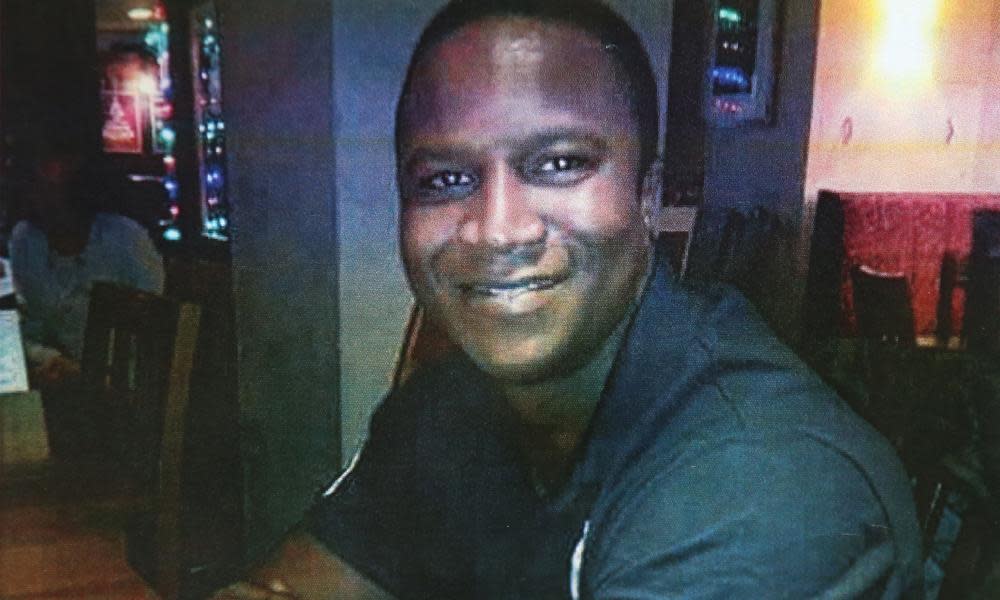Sheku Bayoh: calls for inquiry after new CCTV of arrest emerges

Scottish ministers are facing fresh demands for an inquiry into deaths in custody after new doubts emerged about the case of Sheku Bayoh, who died after being restrained by police.
The Scottish Labour MSP Claire Baker has tabled an emergency question at Holyrood asking for a government statement on the Bayoh case after BBC Scotland broadcast previously unseen CCTV footage of his arrest three years ago that appeared to contradict police accounts of what took place.
“The information revealed [by the BBC] raises serious questions that must be urgently answered and that is why I am seeking to raise these directly in parliament,” Baker said.
“The Scottish government must commit to undertaking an inquiry into deaths in custody in Scotland. We can’t be complacent about the issues that have become evident. There are serious questions to be asked about the police response, the way in which deaths in custody are investigated, and how families are treated when they lose a loved one.”
Bayoh died in hospital on 3 May 2015 after being restrained by a group of officers responding to reports of a man behaving erratically and waving a knife on residential streets in Kirkcaldy, Fife, that morning.
He was not carrying a knife when challenged by police. The first officers on the scene used CS and pepper spray to attempt to subdue him, while one officer drew their baton. Bayoh’s death certificate records the cause of death as intoxication by ecstasy and another drug known as “flakka” while being restrained.
His family believe unnecessary force was used to arrest Bayoh, a trainee gas engineer originally from Sierra Leone. They have been pressing for a full public inquiry into his death and for the prosecution of officers involved in his arrest.
It is understood that Scotland’s police complaints body, the Police Investigations and Review Commissioner, has recommended no action be taken against the officers involved. It is thought Scotland’s chief prosecutor, the lord advocate, James Wolffe QC, agrees with that conclusion but is waiting for the family to request an internal review of his findings before issuing a final decision.
Aamer Anwar, the lawyer for the Bayoh family, said their review request would be submitted by Christmas and they expected that review to be concluded within the following month. “The family will accept nothing less than a public inquiry,” he said. “Anything less would be a further betrayal by the Scottish government.”
A Scottish government spokesman said Nicola Sturgeon, the first minister, was open-minded about holding the inquiries at a later date. “Any decision will be contingent on a final decision on criminal proceedings – it would not be appropriate for ministers to pre-empt that at this stage by commenting on any related matters,” the spokesman said.
The BBC documentary said the CCTV footage contradicted police accounts of what took place, including claims issued by a lawyer for the Scottish Police Federation and police witnesses that Bayoh had “punched, kicked and stamped” on a female officer before he was restrained.
The documentary argued that CCTV footage showed Bayoh punching the officer on the head after he had been hit by the incapacitant sprays and threatened by the baton, but no kicking or stamping by him is visible. She was seen walking away.
He was then quickly taken to the ground by the police and put in handcuffs and leg restraints while officers lay across his body. The CCTV footage suggests that happened within 42 seconds of the first two officers’ arrival at the scene.
Calum Steele, the general secretary of the Scottish Police Federation, the trade union for police officers, declined to answer questions about the documentary. He issued a letter on Twitter that criticised the BBC but was written before the programme was aired.
Steele accused the BBC reporter involved, Mark Daly, of planning to broadcast “fundamental inaccuracies which wholly misrepresent the realities of the events surrounding the death of Mr Bayoh”.
In light of the decision of BBC to use a partial statement from the SPF - here is the full detail of the letter sent to Mark Daly. pic.twitter.com/PuyJQMiF9S
— ScotsPolFed (@ScotsPolFed) December 17, 2018
Eric Baskins, an expert on police restraint techniques at Liverpool John Moores University, told the BBC that while Bayoh showed no signs of being a danger, police arrived ready to use force, getting out of their vans with sprays and batons.
“That doesn’t seem to me measured,” Baskins said. “That is not best practice, and all of those actions were very escalatory. Once you ramp things up to a certain degree, it is very difficult, if not impossible, to backtrack.”

 Yahoo News
Yahoo News 
